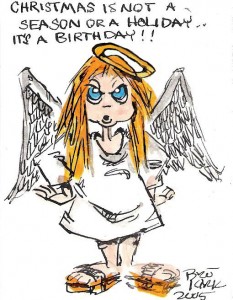
Yesterday I wrote about how Christmas being about Christ would be better communicated by how Christians live that people attaching the abbreviated name “Xmas.”
Along the same lines is the debate about the governmental definition of “marriage.” There’s different cultural forces in the debate about that word. Christians are told that everyone is offended by them saying the name of the Federal Holiday “Christmas” so they must not say it. You must not ask people to be tolerant of your perspective. With marriage, there is a very purposeful effort to create a new definition, which would be legally forced on everyone to accept. One point being: you will not be tolerated for your beliefs (calling Christmas “Christmas”), but you will be legally required not to tolerate but to accept and have your children taught someone else’s beliefs (changing the millennials-old religious concept of “marriage.”)
This isn’t the first time in American history that marriage has come under attack. Possibly a greater attack was when divorce was made legally quick and easy. Today Christian marriage doesn’t stand out in American culture from non-Christian marriage. Christians, including multiple pastors by whom I’ve been taught, have divorced. We’ve caved. We’ve gone the convenient route of compromising our covenants. We’ve changed beliefs about marriage because it became legally and socially acceptable to break our bonds of covenant, which are supposed to symbolize the commitment of God to his people. We aren’t acting like Hosea, we’re acting like Hosea’s wife.
I’ve often thought that the case for Christian marriage wouldn’t be a verbal sparring or a federal constitutional amendment. (My libertarian side doesn’t think the federal government should get into this debate, but leave it up to the states. Neither side of the argument agrees with me as everyone would seemingly rather force their ideas on everyone rather than allow choice.) I’ve thought the stronger case would be for there to be a revolution regarding the theology of marriage among Christians.
G. K. Chesterton makes a surprisingly logical and secular case for Christian marriage in Orthodoxy. It’s part of a great chapter by a great book by perhaps my new favorite author – but I’ll write more on Chesterton and this book later. Here Chesterton is writing about his disagreement with his peers that believe a perfect utopia would be the dissolution of all personal bonds. He sees that as a dystopia. It seems that Chesterton’s comments lean toward a perspective that argues for protection of the marriage concept as something that is for the good of society.
What is your perspective? Here’s Chesterton:
I could never conceive or tolerate any Utopia which did not leave to me the liberty for which I chiefly care, the liberty to bind myself. Complete anarchy would not merely make it impossible to have any discipline or fidelity; it would also make it impossible to have any fun. To take an obvious instance, it would not be worth while to bet if a bet were not binding. The dissolution of all contracts would not only ruin morality but spoil sport. Now betting and such sports are only the stunted and twisted shapes of the original instinct of man for adventure and romance, of which much has been said in these pages. And the perils, rewards, punishments, and fulfilments of an adventure must be real, or the adventure is only a shifting and heartless nightmare. If I bet I must be made to pay, or there is no poetry in betting. If I challenge I must be made to fight, or there is no poetry in challenging. If I vow to be faithful I must be cursed when I am unfaithful, or there is no fun in vowing.
You could not even make a fairy tale from the experiences of a man who, when he was swallowed by a whale, might find himself at the top of the Eiffel Tower, or when he was turned into a frog might begin to behave like a flamingo. For the purpose even of the wildest romance results must be real; results must be irrevocable. Christian marriage is the great example of a real and irrevocable result; and that is why it is the chief subject and centre of all our romantic writing.
And this is my last instance of the things that I should ask, and ask imperatively, of any social paradise; I should ask to be kept to my bargain, to have my oaths and engagements taken seriously; I should ask Utopia to avenge my honour on myself.



 The Transportation Security Administration (TSA) has implemented new procedures which include a special type of full-body X-Ray whose radiation is absorbed into your skin and the tissue just under the skin, to produce a naked image of the passenger, and/or the passenger must be patted-down including the passengers sexual organs.
The Transportation Security Administration (TSA) has implemented new procedures which include a special type of full-body X-Ray whose radiation is absorbed into your skin and the tissue just under the skin, to produce a naked image of the passenger, and/or the passenger must be patted-down including the passengers sexual organs.